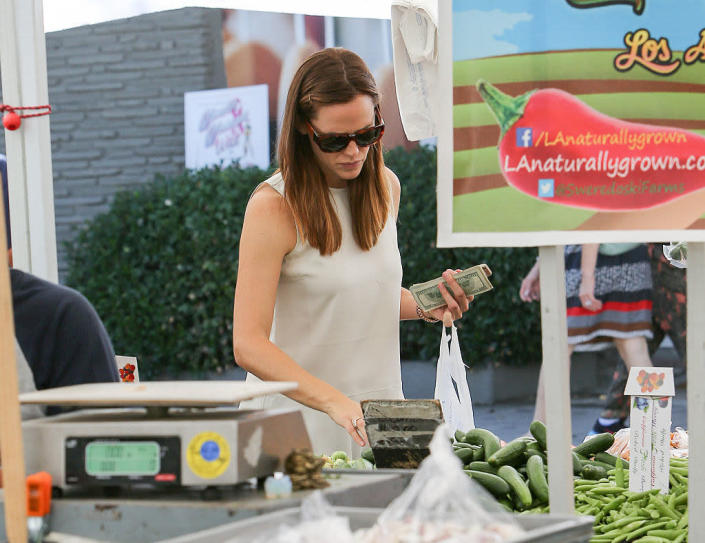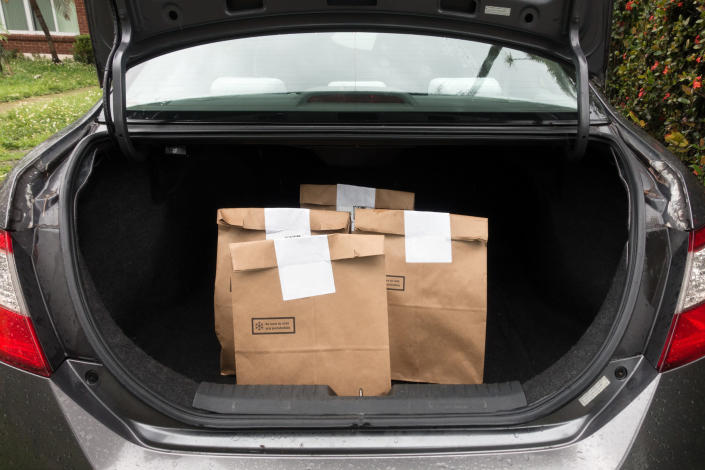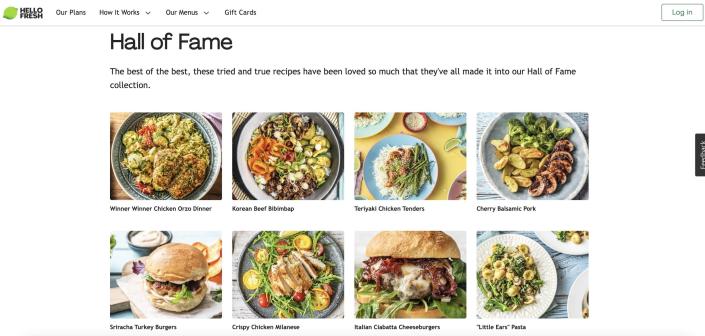A Teenager Asked For Advice On Grocery Shopping For The First Time, And People Responded With Genuinely Excellent Tips
[ad_1]
Grocery shopping efficiently is a valuable skill that just isn’t taught in schools. Some of us learned by watching our parents shop, and some of us are in our 30s aimlessly wandering around our local Albertsons like a zombie with a shopping cart.
NBC / Via giphy.com
With prices rising everywhere, it seems like we’re all trying to figure out how to make the most of the time and money that we do have.
I’m always looking for ways to improve and be a “better” adult, so I was relieved when teenager u/LonelyAirport8833 asked older adults, “How do I shop for groceries?” They offered so many genius tips and strategies that honestly left me rethinking how I’m going to handle my next grocery trip:
1.“I usually pick one protein, typically chicken or beans for me, and make it at the beginning of the week. Then, I buy veggies and carbs to make different meals. Like, I’ll buy a pack of chicken, get lettuce, tomatoes, onions, carrots, tortillas, pasta, tomato sauce, rice, soy sauce. Then I have ingredients for tacos, chicken fried rice, pasta, and even salad.”

“I like rice and pasta as low-cost staples that can be used as mentioned to extend meals. Think about staggering the extended meals: meal #1, meal #2, leftover meal #1 modified, leftover meal #2 modified. With this way, you only have two big cooking days and then two lower-effort cooking days. And more important, you’re breaking things up, so your leftovers will feel less like leftovers and more like a new meal.” —u/Zeroflops
“I try to also make my recipes for the week that use similar ingredients to save this problem. If I’m hankering for a salad, ok I will buy that head of lettuce. But now the other meals for my week will be lettuce wraps, chicken caesar salad roll ups, and taco night. Now I have more use out of that head of lettuce than I would have if I just made a salad.” —u/wannabe_pineapple
Sydney Martin / Via BuzzFeed
2.“Not wandering down aisles you don’t need to be in helps cut down on impulse purchases, and larger stores like Walmart and Hy-Vee will tell you on their website where to find the items you’re looking for — it’s usually listed by aisle, possibly even subsection of the aisle. So you can map out your entire shopping trip before you go to the store.”

“My local grocer H-E-B has an app where you can even maintain your grocery list. Then it will reorganize your list by aisle after you select which location you’re headed to.” —u/TexasWinnie
“I recommend shopping at smaller grocery stores like Aldi or Lidl. I have anxiety, and their smaller stores help me learn where everything is. They’re also much cheaper. You just have to bring a quarter to get a cart, and bring your own bags.” —u/hannahdem96
ABC
3.“If you’re on a budget, most grocery stores have apps now, and you can add coupons for things you need. When you scan the app’s barcode at checkout, the coupons will apply.”

4.“When you live with other people, what you can start with is going into the fridge and look at all the stuff that’s open and getting used — that’s your starter list. Then after that, go to who you’re buying goods for and read the list to them as what you’re planning to buy and ask if they have any suggestions.

5.“I like to organize my grocery list so I don’t forget things or waste too much time at the store. I write headings based on where you’d find things: Produce, eggs/dairy, meat, canned goods, dry goods, frozen, and so on. See if your grocery store has a bulk section as well — oftentimes, the seasonings and grains are a better value. I really like the bulk seasoning, and some extra flavor never hurts when you’re learning to cook.”

6.“To start, get the basics of what you typically consume. I usually also have things that I can throw together quickly if I’m not in the mood to cook: Cereal, sandwich stuff, pasta, frozen meals, etc.”

7.“Check out the weekly ads for your local stores to get an idea of who has the best sales and general pricing. Go through the ad, and make your list. You may have stuff you don’t necessarily need at the moment, but you can stock up on non-perishables while they are on sale. You can also save quite a bit by getting a membership or rewards card, and it’s usually free.”
8.“Don’t buy the stuff at eye level. Look down for cheaper-priced items of the same kind, including store brands.”
9.“I highly recommend meal planning your weeks. It results in a lot less wasted food than just buying what looks good without a plan. Look for versatile foods: If you buy a pack of chicken and rice for one night, those same two foods, plus a couple extra ingredients, can be used to make a stir fry another night. I always make sure in my meal planning that the ingredients can stretch into other nights.

“I’d also check out coupon books and websites of where you shop for inspiration.” —u/Lululucy
“Inventory what you have on hand. Then, check what is on sale. Make a menu of recipes for the next week using as many items that you already have or are on sale, and make the list of items you need to buy.” —u/PopcornSpectator
Andreypopov / Getty Images/iStockphoto
10.“If you want to ease into shopping and cooking, try Trader Joe’s. Most of their frozen or pre-prepared food only needs you to do half the work, and you can get an idea what cooking from scratch is like. Also, their products are normally well-priced.”

11.“Don’t buy things just because they’re healthy or you think you should get them, like milk, bread, eggs. Buy things you know you will eat. I suggest making a list of your top 10-15 favorite meals, including breakfast. These meals can be anything from fast food to family recipes to cereal — think of what you enjoy eating and foods that make you happy. Then look at which meals you can reasonably adapt to make at home, which ones are better processed/out of a box, and how they’ll keep if you need to pack lunches or meal prep in advance. If you like burgers and fries, you could start with cheap buns and frozen patties, and adapt the fries to cubed roasted potatoes since potatoes are cheaper and easier to cook than buying bags of fries. Once you get those basics down and are eating things you enjoy, you’ll feel comfortable branching out with new recipes you can meal plan.

“Other ideas could be making your own pizza with pre-made dough from the bakery section, getting your own sauce and cheeses, and whatever toppings you likes. Chicken nuggets become breaded chicken thighs and breasts baked in the oven. But mac and cheese I prefer from the box, and eat it as a quick and easy meal.
“If you’re not a fan of veggies or other healthy foods, search for hidden veggie or fruit recipes related to those 10-15 meals. I used to get a lot of my vegetables in the form of things like adding frozen spinach to ground beef or drinking smoothies. It’s the nutrients that count, not the way you eat them.” —u/remembering_things
Sydney Martin / Via buzzfeed.com
12.“When shopping at the store, get non-frozen things first. From experience, if you get frozen stuff at the start, they will begin to thaw once you’re checking out.”
13.“I keep a mini-whiteboard in the kitchen so that I can note down anything I run out of or suddenly think of getting, that way I don’t forget. Then I take a photo of it, and that’s my shopping list when I go to the store!

“I know there are better ways of grocery shopping, but this is a solid supplementary tactic for myself.” —u/johnthestarr
10’000 Hours / Getty Images
14.“A tip that helped me when I first started living alone is to round prices up to the nearest dollar and track what you’ve picked up. It gives you a good idea of how much of your budget you are spending, so you know when to go to the counter and when you can afford to pick up a treat.
“Bonus: Your estimate will be higher than what you actually pay, and you’ll have ‘extra’ money for your piggy bank.” —u/Constant_Parsley3609
15.“Frozen vegetables are also great, especially if you don’t feel like you’ll use all the vegetables you get. And chicken is a good staple to get — you can get a box of chicken breasts and then put most in the freezer while you cook a piece every couple days. Stuff like rice and salt lasts a long time, and stores easily.”

16.“Don’t go to the grocery store hungry. Your stomach will always talk you into buying a ton of unnecessary food that seems like a good idea at the time, but is ultimately a waste of money.”
17.“Look at different stores to compare prices and selection. You’ll find that some stores price certain products fairly higher compared to others. My own shopping plan is that I go to Costco for bulk purchases like paper, detergent, eggs, and bottled water, an Asian grocery for meat and seafood, and a local large grocer (mine is ShopRite) for smaller purchases of vegetables and meat that aren’t available at the other two.”

“Every food vendor works on the idea of a ‘loss leader,’ which are commonly purchased items at a cheap price that get you in the door. Then, they sock it to you on other stuff. It is a very good idea, once you get an idea of what you buy regularly, to take a list to different places, check price to price, and see which place ends up being cheapest. It might surprise you.” —u/NoOneStranger_227
“I used to go to a small Asian market in Seattle. They got produce from the exact same places as Whole Foods, just at the end of their deliveries. Deliveries would stop by with anything left over from the day, and they’d sell it at the Asian market for a third of the price you find it at larger grocery stores.” —u/Woodnote_
Marco Garcia / Getty Images for Blackyoonicorn Press
18.“If you are flexible with shopping times, check Google to see when the store is less busy — it tends to be easier to shop when there are less people in the store, especially in the beginning while this is still new and you will likely want to take some extra time.
“If you are looking for fresh items from the bakery or deli though, you may want to try to go earlier in the day if possible.” —u/OrganizationHorror69
19.“If you regularly cook, your food breakdown is going to be something like meat, vegetables (fresh or frozen), starches (pasta, rice, potatoes, beans, etc.), spices and sauces, desserts/sweets (including breakfast cereal), fruits, and cooking essentials (flour, sugar, cooking oils, butter). If you do not cook, your food breakdown is going to be more like frozen foods, dried foods, canned foods, and prepared foods. Some foods you buy on a week-by-week basis; others you buy month-by-month or even year-by-year. So you have to consider how long food lasts before it starts to go bad — understanding storage times allows you to make good choices of how much to buy when you shop.

“Meat lasts for a couple of days in the fridge, and 3-6 weeks in the freezer. Vegetables last for about a week in the fridge, and 3-6 weeks when frozen. Dried starches last pretty much forever, though potatoes start to germinate after 1-2 weeks, and the buds have cyanide in them, so must be trimmed!
“Spices and sauces should be stored out of the light. Ground spices keep their flavor, if properly stored, for a couple of months. Most sauces can be stored at room temperature until opened, then need to be refrigerated — they last up to a month at that point.
“Frozen deserts like ice cream keep for a good amount of time, but will develop freezer burn after a few weeks. Fresh fruit should be eaten within a week, though when frozen they keep for a month or two.
“Cooking essentials keep for a long time at room temperature, though cooking oils do go bad at a certain point (check the date), and butter should typically be used within a few weeks.
“Frozen food usually keeps for a couple of months, and canned/dried food pretty much is good to store forever, as long as it’s not opened.
“And please throw out food when it goes bad, or if you find it in the fridge and don’t have the foggiest idea what it is. Just throw it out.” —u/NoOneStranger_227
Roberto Westbrook / Getty Images/Tetra images RF
20.“Always check produce to make sure it is not rotting, especially if it comes in a bag.”
21.“See if you have any farmer’s markets, or mom-and-pop produce stores in your area. Produce is typically much less expensive and much higher quality in these places than what you would find in a chain grocery store.”

“And if you’re not picky on brands, look for the particular brand that’s on sale. There’s typically one that is discounted that week or buy one/get one free or something along those lines.” —u/Always_Trying01
Bauer-griffin / GC Images
22.“Look at the unit price per each, or price per ounce/mg, rather than the actual price of the item. Larger grocers like Walmart usually have the price per ounce in small numbers below the actual price, and it often says that the bigger bag of something is a better deal. It sounds insignificant, but on pricey items like meat or drinks, it adds up very fast.”
23.“What I do is order from my nearest Walmart online, schedule a pickup for the weekend, pay with my Walmart credit card, get them picked up for free, and the 5% cash back lets me get gift cards to take my partner out to eat once or twice a month, basically for free!”
24.“Learn basic recipes. Sure, that bag of flour and accessories might be more money to start. However, you can make pancakes, waffles, biscuits, and more. Over time, you’re saving money by not having to buy frozen food every time.”
Netflix / Via giphy.com
“If you are all moving out for the first time, then for the first few shops you will find yourself needing to stock up on more things than you will be later on during your usual shopping trips. Get your basic condiments, pantry items, and seasonings — don’t forget salt, pepper, oil!” —u/masofon
25.“One thing I’ve found that works well for me is using my grocery store’s pickup service. I have anxiety going into the store itself, then get overwhelmed and forget stuff. Large stores like Walmart have free pickup, and you don’t have to shop inside the store. Some places don’t even charge extra for pickup, so it’s super convenient. Just get some stuff that you like, easy things to start, and you can expand from there. You don’t have to get everything all at once, so don’t overthink it!

“You can stop by the store and grab little things like seasonings, oils, and sauces as you need them, and you’ll build up your pantry of things you like to keep on hand.” —u/Snutterbips
Tovfla / Getty Images/iStockphoto
26.“If you need inspiration, totally sign up for one of those meal plans for free for a week — they usually have promotions for new customers. Keep the recipe cards because you can use them to make future recipes and see what ingredients you’ll need. And you’ll get free meals, too.”

27.“If you are feeding multiple people, a slow cooker like a Crockpot is a great idea. There are hundreds of cookbooks made specifically for them, or you can search online for slow cooker recipes and check out what appeals to you. Then you can use the recipes as a basis for the grocery list.
“These are great inspirations for first-time grocery shoppers and people learning to cook. Dishes like chili are cheap, easy, and you can make big batches of it.” —u/redshavenosouls
28.“Do yourself a favor and identify one splurge item — mine is ice cream, and I always have it. If you give yourself permission to have something just because you enjoy it, it’s easier to reign yourself in on the important stuff when shopping. I don’t mind not grabbing candy or chips because I have a tub of ice cream in the freezer.”

Which tips did you find most helpful? Or do you have your own fresh strategies for grocery shopping efficiently? Let me know in the comments!
Note: Submissions have been edited for length and/or clarity.
[ad_2]
Source link






